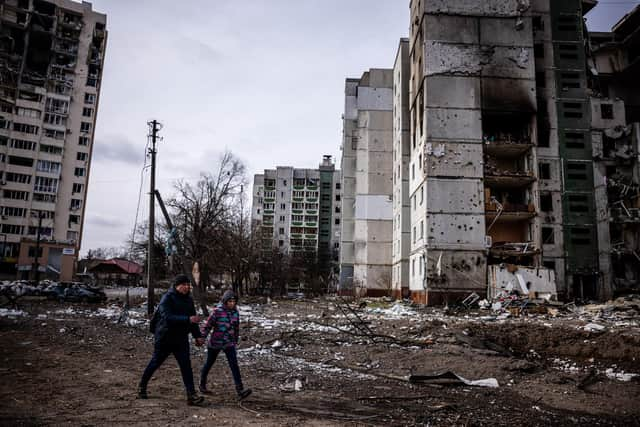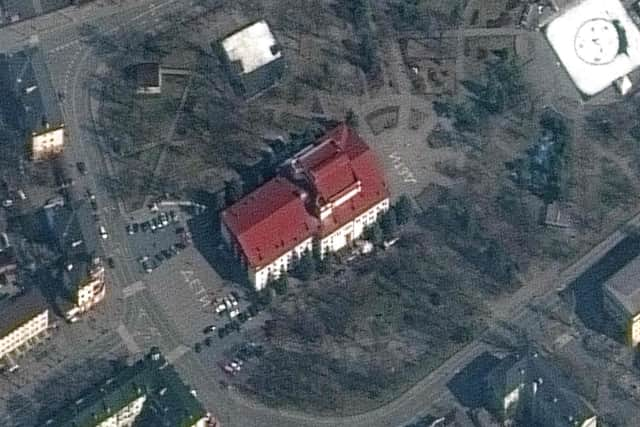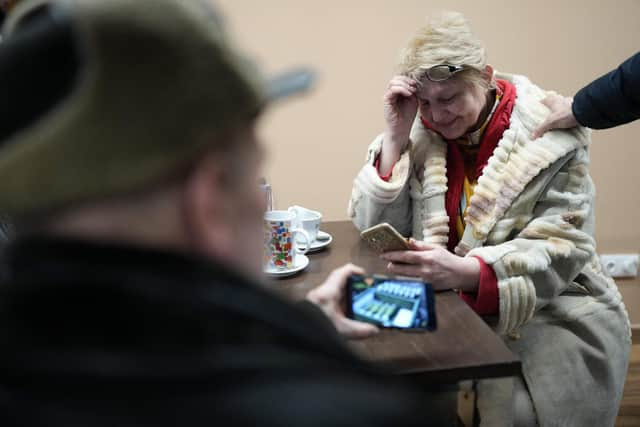Ukraine-Russia war: Vladimir Putin's forces bombed civilians in Syria then lied about it, and they are doing the same in Ukraine – Naomi McAuliffe, Amnesty International
Strikes on protected objects such as hospitals and schools, the use of weapons such as ballistic missiles and the use of banned weapons such as cluster bombs may all qualify as war crimes.
In the weeks following the invasion, Russian authorities have proven what drastic measures they will take to deny and deflect responsibility for the horror the Kremlin has unleashed in Ukraine.
Advertisement
Hide AdAdvertisement
Hide AdWe have seen an unprecedented nationwide crackdown – akin to “scorched-earth” tactics – against independent journalism and anti-war protests, and this week access to Amnesty International’s Russian-language website was blocked.
The Kremlin has lied about killing civilians in the kind of merciless and indiscriminate attacks such as the ‘dumb bomb’ air strike, verified by Amnesty, on March 3, which reportedly killed 47 civilians as they queued for bread in Chernihiv.
Russian officials and state media have also accused Ukraine of war crimes, claiming that attacks such as the shelling in rebel-held Donetsk which killed multiple civilians this week were carried out by Ukraine against its own people.
Ukrainian authorities have denied such allegations claiming them as so-called ‘false flag’ operations carried out by Russia, and designed to justify retaliation. On Tuesday, Nato Secretary-General Jens Stoltenberg warned of his concern that Russia might use chemical weapons in a false flag attack as part of its invasion of Ukraine. His statement came after Russia accused Ukraine of developing chemical weapons.


Many of the accusations levelled at Russia are in keeping with a pattern of behaviour well-documented in previous conflicts. Russia’s war crimes in Syria are undisputed by the international community – and fly in the face of present day Kremlin claims that use of banned weapons and indiscriminate attacks against civilians represent any kind of line in the sand for Russia.
Russia’s armed forces formally intervened militarily in the armed conflict in Syria in September 2015 on the side of the Syrian government, a long-term ally, launching multiple air strikes.
Fixed-wing military aircraft carried out thousands of sorties across the country and attacked thousands of locations that Russia described as “terrorist” targets. Russia’s armed forces also deployed long-range bombers from Russia, sea-launched cruise missiles, combat helicopters, tanks, artillery and multiple rocket launcher systems.
An Amnesty report, called ‘Civilian objects were not damaged’: Russia’s statements on its attacks in Syria, unmasked focused on six attacks in Homs, Idleb and Aleppo between September and November 2015 which killed at least 200 civilians and around a dozen fighters.


Advertisement
Hide AdAdvertisement
Hide AdOur investigation set out evidence suggesting that Russian authorities may have lied to cover up civilian damage to a mosque from one air strike and a field hospital in another; and points to Russia’s likely use of internationally banned cluster munitions and of unguided bombs in populated residential areas – acts which amount to war crimes.
As in 2022, in 2015 the Russian authorities claimed that their armed forces were only striking “terrorist” targets. After some attacks, they responded to reports of civilian deaths by denying they killed civilians; after others, they simply stayed silent.
The Russian authorities’ reaction to an attack on Omar Bin al-Khattab mosque in central Jisr al-Shughour, Idleb governorate, on October 1, 2015, raised serious questions about the tactics they are prepared to deploy to undermine criticism of their operations.
After reports and photos of the destroyed mosque emerged, the Russian authorities responded by calling it a “hoax”, presenting a satellite image purporting to show the mosque still intact. However, the mosque shown in the image was confirmed as a different building from the one destroyed.


Any claims of civilian deaths as a result of Russian aggression in Syria were dismissed as part of an “information war”. In response to Amnesty’s evidence, Russia’s Defence Ministry branded the report biased, saying it contained “trite cliches” and “fake information”.
Russia has relied heavily on misinformation, both at an international and domestic level, to facilitate and enable its violations of international law and killing of civilians – and it is doing so again now.
The invasion of Ukraine is simply an escalation of the aggression and false information we have seen from the Kremlin before. Its acts cannot remotely be justified on any of the grounds that Russia has offered, yet all of this is being committed by a permanent member of the UN Security Council.
Amnesty has stressed the importance of accountability, but this will not happen without concerted efforts from the UN and member nations. At the beginning of March, the International Criminal Court (ICC) launched an investigation following Russia’s invasion of Ukraine. The referral for investigation by 39 countries is very welcome and will expedite the process.
Advertisement
Hide AdAdvertisement
Hide AdThe plight of refugees from Ukraine has rightly received a lot of attention, and Amnesty has made several calls around protection, without discrimination, for those fleeing – not least in the UK where the response to the crisis has been botched and bureaucratic.
The ICC investigation and efforts to hold Russian authorities accountable for their atrocities will also be key to exiting this crisis however. Victims of this conflict must have justice – and it is vital that the UN’s ability to contain and hold accountable those committing war crimes is not undermined or others may be emboldened to follow Russia’s lead.
Naomi McAuliffe is Amnesty International UK’s Scotland programme director
A message from the Editor:
Thank you for reading this article. We're more reliant on your support than ever as the shift in consumer habits brought about by coronavirus impacts our advertisers.
If you haven't already, please consider supporting our trusted, fact-checked journalism by taking out a digital subscription.
Comments
Want to join the conversation? Please or to comment on this article.
